Alex Falcó es el humorista gráfico invitado en este “vis a vis”. Para los lectores de Humor Sapiens que no lo conozcan, les doy algunos datos biográficos:
Es graduado del Instituto de Ciencias Pedagógicas “Enrique José Varona” de La Habana como profesor de artes, 1990.
Ilustra para varios medios impresos y digitales en Francia, Estados Unidos, España y Holanda entre otros. Sus dibujos han sido publicados en revistas como El Correo de la UNESCO, Courrier International y Aceprensa. Ha colaborado con la UNICEF y Amnistía Internacional España.
Su ilustración de portada “Apocalypse Now” para la revista Courrier International, obtuvo el Premio Prix RELAY a la mejor portada de revista del año 2017 en Francia.
Ha realizado más de 25 exposiciones personales y más de 50 colectivas.
Se le otorgó la Distinción por la Cultura Nacional en el año 2020, La Habana, Cuba.
Ha sido invitado a participar en eventos internacionales como el de Caricatura de Prensa (RIDEP) en Nantes, Francia, en 2002 y 2009; ComicDom, en Atenas, Grecia, 2011; Convención Anual de la Asociación de Caricaturistas Editoriales de los Estados Unidos en California, 2014 y en la ONG Americas Latino Eco Festival, Denver, Colorado, Estados Unidos 2016 y 2017, del cual es Director Creativo.
Miembro de Frente Viñetista, España.
Tiene publicado 5 libros infantiles.
Actualmente reside en Bilbao, España donde continúa su labor de creación artística.
Sus trabajos más recientes pueden ser vistos en: @carlosalejandro.falco/
Desde hace tiempo vengo siguiendo a este creador de humor y hasta tuvimos un contacto extra profesional a través de una amiga en común, nuestra querida Miriam Alonso (EPD).
Es un honor y un placer tenerlo ahora aquí.
PP: Bueno, amigo mío, para los seguidores de Humor Sapiens, ¿puedes presentarte? (Porque quizás mi presentación fue incompleta). ¿Cómo te gustaría que te conocieran, que te recordaran, cuando ya no estemos aquí?
FALCO: Mi nombre completo es Carlos Alejandro Falcó Chang, más corto sería Alex Falcó Chang, pero para casi todos Falco, casi siempre sin la tilde.
Soy graduado como profesor de artes plásticas en la Universidad de Ciencias Pedagógicas en La Habana, Cuba en el 1990.
Respondiendo a como me gustaría que me conocieran, pues te diría como al tipo de los dibujos que provocan reflexiones, quien se acerca a temas desde prismas inusuales y que expresa más con menos estéticamente hablando.
Cuando ya no estuviera en este mundo, quisiera que mis trabajos siguieran provocando los sentimientos y emociones para lo cual las he creado.
PP: Y creo que así será, amigo mío. Comencemos entonces por el principio, como gente hiperinstruida e superinteligente que somos: ¿en qué momento decidiste dedicarte al humor?
FALCO: Empecé a colaborar con dibujos humorísticos cuando tenía unos 12 años en el periódico Palante. La impresión de ver publicado mi primer dibujo fue un gran impulso. Las publicaciones se volvieron más frecuentes, luego también comencé a colaborar con el dedeté y no he dejado nunca de dibujar.
Más tarde fuí miembro del dedeté, publicación que siempre tuvo una estética que me identificaba totalmente.
PP: Cuando empezaste en el dedeté fue que te conocí. A ver, ¿empezaste a dibujar sin estilo? Si tuvieras uno, ¿qué estilo sería? ¿Tuviste alguna influencia de caricaturistas nacionales o extranjeros en ese momento? ¿Cómo ha evolucionado tu trabajo a lo largo del tiempo en términos de forma y contenido?
FALCO: En mis inicios, siendo muy joven, dibujaba sin pensar en un estilo específico. Eran dibujos a líneas y en tinta negra sobre fondo blanco.
Sobre las influencias, la lista es enorme, tanto de artistas cubanos como extranjeros.
En cuanto a la forma y contenido, es claro que con un mayor desarrollo intelectual, pues ha existido una evolución hacia temas universales, forma de decir y donde elaboro más los conceptos y cuido que la forma sea la idónea para una comunicación efectiva.
PP: Como debe ser. Te entiendo. Oye, ¿y qué modo prefieres: dibujar con humor sin palabras o dibujar con textos? ¿Por qué?
FALCO: El dibujo sin palabras es exclusivo, me tipifica sin dudas. Comunicarte 100% sin saber idiomas es genial.
PP: Coincido contigo. Es más universal ese lenguaje. Falco, entre los muchos premios que has recibido, ¿cuál te conmovió más o te impactó más?
FALCO: Me quedaría con el premio Prix Relay 2017 a la mejor ilustración de portada de revista del año en Francia con “Apocalipse Now”.
(https://www.courrierinternational.com/article/medias-courrier-international-recoit-le-prix-de-la-meilleure-couverture-de-lannee)
PP: Perfecto. Te felicito. Ahora dime, ¿cuál es el humor que más te gusta hacer? Te doy variantes:
a-El que simplemente te divierte. b-El que te divierte y te hace pensar. c-El que te hace pensar, pero sólo es crítico, satírico. d-El burlesco, irrespetuoso, ofensivo. ¿Y por qué no escogiste los otros? (si es que dejaste alguno sin escoger, claro)
FALCO: Menos el humor burlesco, cuando se vuelve irrespetuoso y ofensivo, las demás variantes las hago en mayor o menor medida.
PP:¡Bien, Falco! No sabes cuánto odio ese tipo de humor. Bueno, para teorizar un poco: ¿el humorista nace o se hace?
FALCO: Creo que ambos enfoques tienen razonamientos válidos. Por una parte, hay personas que tienen gran facilidad para captar ideas, elaborar situaciones cómicas,una observación aguda y cuando aprecian el mundo cotidiano desde una óptica humorística, pues son características que viene con la persona.
Por otro lado esta persona cuando es capaz de trabajar y practicar, busca perfeccionarse, y se va adaptando a situaciones, podrá llegar a convertirse en un humorista exitoso.
PP: Estamos de aacuerdo, pero me inclino a pensar que el que nace con esa “facilidad” y después se supera, se cultiva, se esfuerza, será mejor humorista que el que solo nació y no se superó y que el que no cació y después se auperó. Y otra pragunta de ese estiulo: ¿es más fácil hacer llorar que hacer reír?
FALCO: Para mí, hacer reír es más fácil, siempre lo intentaré. Claro, por lo del karma también...
PP: ¿Tu karma es hacer reír? Está bueno eso. Y ahora algo más denso: ¿cuáles son los límites del humor, si los hubiera? Y a propósito, ¿fuiste censurado alguna vez? ¿Te autocensuras mucho, poco o nunca?
FALCO: Este debate sobre los límites del humor se mueve en torno a cómo equilibrar la libertad de expresión con la sensibilidad de quienes reciben el mensaje. Aún no existe un consenso universal creo, pues hay muchos factores que dependen de ello.
En cuanto a la a la censura, si, la he sufrido en más de una ocasión. Han sido motivos coyunturales en la mayoría de los casos. He experimentado la autocensura en ocasiones y ha sido en momentos donde ha sido preciso mantener el respecto a otras personas o he precisado más tiempo en ciertas situaciones para reflexionar sobre el impacto que puedo desencadenar con mi opinión y si este es realmente necesario o valioso.
PP: Es lo normal, hermano. Para mí existe la censura externa, ya sea de un gobierno, de un grupo hemónico, de una minoría con poder o de la ignorancia. Yo la he sufrido y veo que tú también. No deben existir límites, por supuesto, pero exiten. Negarlo es no ve la realidad, creo yo. Y la autocensura es natural también que la experimentemos, porque a uno se le puede ocurrir cualquier chiste sobre cualquier tema y de pronto darse cuenta que puede ofender a alguien y no realiza la obra. Eso es autocensura. Como también lo es no crear una obra con un chiste que pueda poner en peligro tu libertad o tu vida. No es oportunismo ni cobardía, es simplemente sensatez. Y hablando más en general, ¿cómo ves el presente y el futuro del humor gráfico? Tanto en Cuba como en el mundo.
FALCO: El humor gráfico creo que está en un momento de transformación. La capacidad de adaptación a los avances tecnológicos y a los cambios sociales será clave para su sustento y alcance. Con el florecimiento de herramientas digitales y audiencias globales por el uso de las redes básicamente, el futuro del humor gráfico lo veo lleno de posibilidades creativas y desafíos interesantes. A mi entender, hay mas emoción que preocupación.
PP: Me pasa que soy optimista como tú en cuanto al futuro, pero soy persimista en cómo está actualmente. Bueno y para desconectar de mi pesimismo, ¿podrías contarnos alguna anécdota cómica, curiosa o ingeniosa, que hayas vivido durante tu trayectoria en el humor?
FALCO: La anécdota que me viene a la mente ocurrió en una exposición personal, donde visitantes debatían cada obra mía y yo me ponía detrás de incógnito. Casi siempre se formaba alguna pequeña discusión sobre lo que significaba cada trabajo y sin saber que yo era el autor, me preguntaban como uno más de los visitantes.
PP: Y tú les comentabas a todos que esas eran las mejores obras del mundo, ja, ja. No, en serio, eso es muy bueno para captar lo que ve el público,,m porque hay matices que no vemos y así podemos mejorar nuestro trabajo, ¿no es cierto? Bueno, para ir cerrando, ¿quieres que te haga una pregunta que no te hice? Si es así, ¿podrías responderla ahora?
FALCO: Justas las preguntas, gracias.
PP: Gracias a ti, amigo mío. Y ahora dime, ¿qué me puedes aconsejar a mí, como humorista?
FALCO: Hombre, consejos esperaría yo de ti.
PP: No, hermano, todos somos imperfectos. Es lo mismo de la pregunta anterior, siempre es bien recibido una mirada de afuera. Aunque esa no fue la intención de la pregunta. Parece que la enfoqué mal. Quería dieras consejo en general para un creador de humor cualquiera. Y ahora, por último, ¿le puedes dirigir unas palabras a los lectores de Humor Sapiens?
FALCO: Que sigan leyendo, sigan riendo y disfrutando, pues en un mundo lleno de seriedad, pesimismo y desgracias, el humor es el superpoder que todos necesitamos.
PP: Buenísimo consejo que espero nuestros lectores te agradecan.
Querido Falco, millones de gracias por tu tiempo y tu atencíón. Sigamos en contacto.
Te deseo mucha salud y muchoos éxitos en tu carrera en el humor.
Un abrazo.
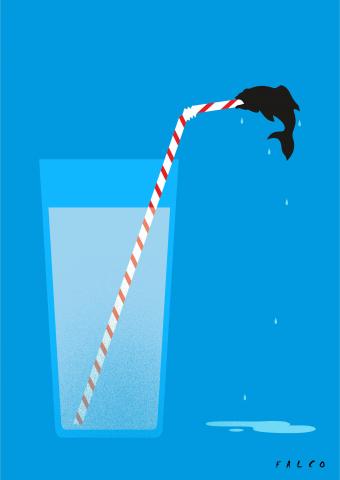
Adaptación
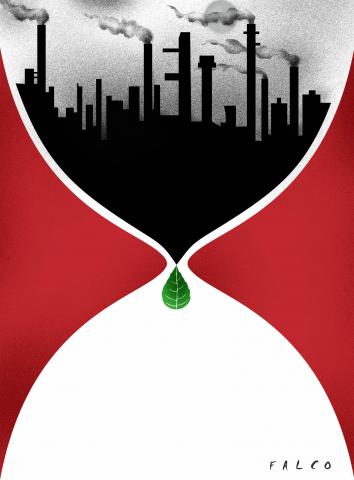
Espejismo
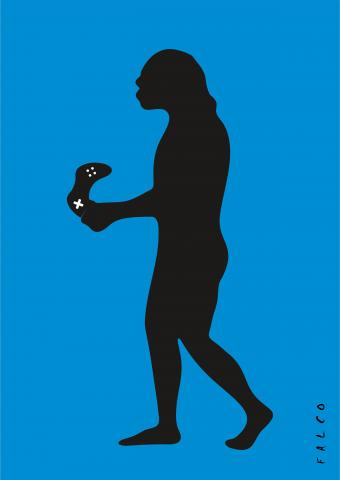
Gamederthal
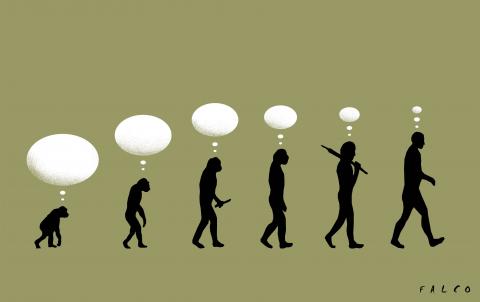
Involución
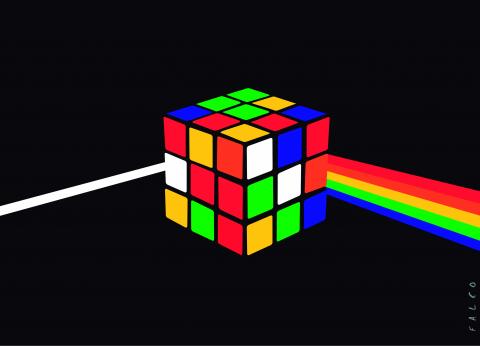
Rubik prisma
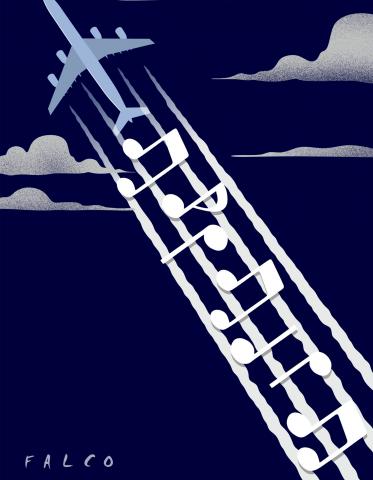
Avión musical
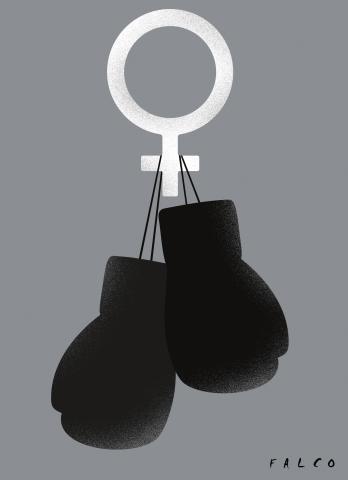
Serie "Violencia de género"
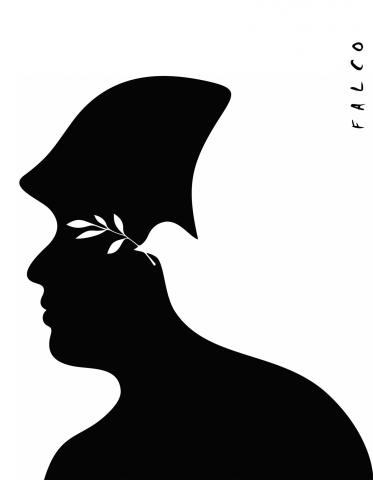
La paloma
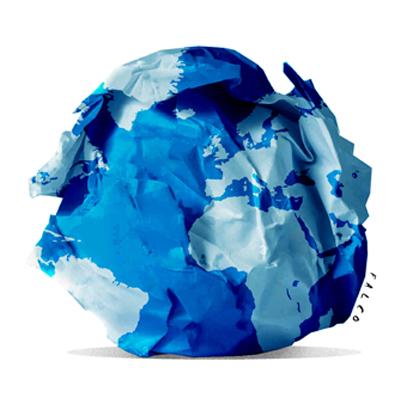
Mundo contemporáneo
Interview with Alex Falcó
by Pepe Pelayo
Alex Falcó is the guest graphic humorist in this “vis-à-vis.” For Humor Sapiens readers who do not know him, here are some biographical details:
He graduated from the “Enrique José Varona” Institute of Pedagogical Sciences in Havana as an art professor in 1990.
He illustrates for various print and digital media in France, the United States, Spain, and the Netherlands, among others. His drawings have been published in magazines such as El Correo de la UNESCO, Courrier International, and Aceprensa. He has collaborated with UNICEF and Amnesty International Spain.
His cover illustration “Apocalypse Now” for Courrier International magazine won the Prix RELAY for Best Magazine Cover of the Year in France in 2017.
He has held more than 25 solo exhibitions and participated in over 50 group exhibitions.
In 2020, he was awarded the Distinction for National Culture in Havana, Cuba.
He has been invited to participate in international events such as the Press Cartooning Event (RIDEP) in Nantes, France, in 2002 and 2009; ComicDom in Athens, Greece, in 2011; the Annual Convention of the Association of Editorial Cartoonists of the United States in California in 2014; and the NGO Americas Latino Eco Festival in Denver, Colorado, in 2016 and 2017, where he serves as Creative Director.
He is a member of Frente Viñetista, Spain.
He has published five children's books.
He currently resides in Bilbao, Spain, where he continues his artistic work.
His most recent works can be seen at: @carlosalejandro.falco/
I have been following this humor creator for a long time, and we even had a professional connection through a mutual friend, our dear Miriam Alonso (RIP).
It is an honor and a pleasure to have him here now.
(This vis-à-vis took place in 2025.)
PP: Well, my friend, for Humor Sapiens followers, could you introduce yourself? (Because perhaps my introduction was incomplete). How would you like to be known and remembered when we are no longer here?
FALCO: My full name is Carlos Alejandro Falcó Chang, shortened to Alex Falcó Chang, but almost everyone calls me Falco, usually without the accent.
I graduated as a professor of plastic arts at the University of Pedagogical Sciences in Havana, Cuba, in 1990.
As for how I would like to be known, I would say as the guy whose drawings provoke reflection, who approaches topics from unusual angles, and who expresses more with less, aesthetically speaking.
When I am no longer in this world, I hope my work continues to evoke the emotions and feelings for which it was created.
PP: And I believe it will, my friend. So let’s start from the beginning, as the highly educated and super-intelligent people we are: at what moment did you decide to dedicate yourself to humor?
FALCO: I started collaborating with humorous drawings when I was about 12 years old for the newspaper Palante. Seeing my first published drawing was a great boost. The publications became more frequent, and later I also started collaborating with dedeté, and I have never stopped drawing.
Later, I became a member of dedeté, a publication that always had an aesthetic that fully identified with me.
PP: When you started at dedeté was when I first knew about you. So, did you start drawing without a defined style? If you had one, what would it be? Did you have any influence from national or foreign cartoonists at that time? How has your work evolved over time in terms of form and content?
FALCO: In my early days, as a very young artist, I drew without thinking about a specific style. My drawings were line-based, in black ink on a white background.
As for influences, the list is huge, including both Cuban and foreign artists.
Regarding form and content, as I developed intellectually, my work evolved towards more universal themes, refining how I convey ideas and ensuring that the form is appropriate for effective communication.
PP: As it should be. I understand. Hey, which method do you prefer: humor drawing without words or drawings with text? Why?
FALCO: Wordless drawing is unique, it definitely defines me. Being able to communicate 100% without knowing any languages is amazing.
PP: I agree with you. That language is more universal. Falco, among the many awards you have received, which one moved or impacted you the most?
FALCO: I would say the Prix Relay 2017 for the best magazine cover illustration of the year in France for “Apocalypse Now”.
(https://www.courrierinternational.com/article/medias-courrier-international-recoit-le-prix-de-la-meilleure-couverture-de-lannee)
PP: Perfect. Congratulations. Now tell me, what kind of humor do you like to create the most? I’ll give you some options:
a) The one that simply entertains you.
b) The one that entertains and makes you think.
c) The one that makes you think but is only critical or satirical.
d) The burlesque, disrespectful, offensive one.
And why didn’t you choose the others (if you left any out, of course)?
FALCO: Except for burlesque humor when it becomes disrespectful and offensive, I use all the other variants to a greater or lesser extent.
PP: Good, Falco! I absolutely despise that kind of humor. Well, let’s theorize a bit: is a humorist born or made?
FALCO: I think both perspectives have valid arguments. Some people have a natural ease for capturing ideas, crafting comedic situations, and a sharp observation that allows them to perceive the world humorously.
On the other hand, if that person works, practices, seeks improvement, and adapts, they can become a successful humorist.
PP: I agree, but I lean towards believing that those born with that “ease” and then improve, cultivate themselves, and strive will be better humorists than those who were born with it but never improved, or those who weren’t born with it but later trained. And another question along those lines: is it easier to make people cry or to make them laugh?
FALCO: For me, making people laugh is easier. I’ll always try. Of course, because of karma too...
PP: Is your karma to make people laugh? That’s a good one. Now, something heavier: what are the limits of humor, if there are any? And by the way, have you ever been censored? Do you self-censor a lot, a little, or never?
FALCO: This debate about the limits of humor revolves around how to balance freedom of expression with the sensitivity of those receiving the message. I believe there is still no universal consensus since many factors come into play.
Regarding censorship, yes, I have experienced it on more than one occasion. In most cases, it was due to situational circumstances. I have also experienced self-censorship at times when it was necessary to maintain respect for others or when I needed more time in certain situations to reflect on the impact my opinion might have and whether it was truly necessary or valuable.
PP: That’s normal, brother. I believe there is external censorship—whether from a government, a hegemonic group, a minority with power, or simply ignorance. I have experienced it, and I see you have too. There shouldn’t be limits, of course, but they exist. Denying that is ignoring reality, in my opinion.
And self-censorship is also natural because anyone can come up with a joke about any topic and then realize it might offend someone, so they choose not to create the piece. That is self-censorship. Just as it is also self-censorship when someone refrains from making a joke that could put their freedom or life at risk. That’s not opportunism or cowardice—it’s simply common sense.
And speaking more broadly, how do you see the present and future of graphic humor, both in Cuba and globally?
FALCO: I think graphic humor is in a period of transformation. The ability to adapt to technological advances and social changes will be key to its sustainability and reach. With the rise of digital tools and global audiences through social media, I see the future of graphic humor as full of creative possibilities and interesting challenges. In my view, there is more excitement than concern.
PP: I share your optimism about the future, but I’m more pessimistic about its current state. Well, to shake off my pessimism, could you share a funny, curious, or clever anecdote from your career in humor?
FALCO: The anecdote that comes to mind happened during a solo exhibition, where visitors would debate each of my works while I stood behind them incognito. Almost always, small discussions would break out about the meaning of each piece, and without knowing I was the artist, they would ask for my opinion as if I were just another visitor.
PP: And you told them they were the best works in the world, right? Ha ha! No, seriously, that’s a great way to understand how the audience perceives your work, because there are nuances we might not see, and that can help us improve, don’t you think?
Well, to wrap things up, is there a question I didn’t ask you that you’d like me to? If so, could you answer it now?
FALCO: The questions were spot on, thank you.
PP: Thank you, my friend. Now tell me, what advice can you give me as a humorist?
FALCO: Man, I should be the one asking you for advice.
PP: No, brother, none of us are perfect. It’s like the previous question—an outside perspective is always welcome. Though that wasn’t really my intention with the question. I meant for you to give general advice to any humor creator.
And finally, could you say a few words to the readers of Humor Sapiens?
FALCO: Keep reading, keep laughing, and keep enjoying, because in a world full of seriousness, pessimism, and misfortunes, humor is the superpower we all need.
PP: Great advice! I hope our readers appreciate it.
Dear Falco, a million thanks for your time and attention. Let’s stay in touch.
I wish you good health and much success in your career in humor.
A big hug.
(Some texts have been translated into English by ChatGPT)

